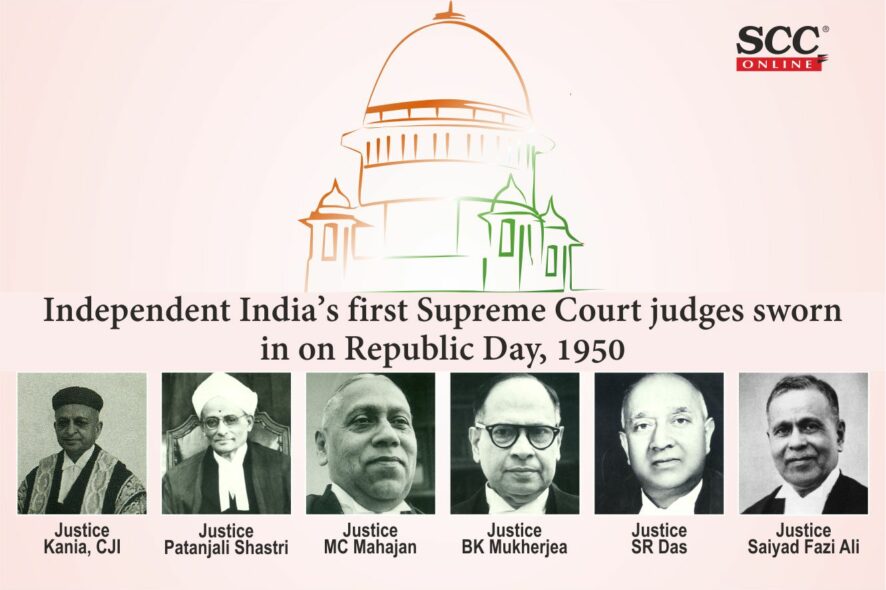On 26th January, 1950, the Constitution of India came into force, also marking the establishment of the Supreme Court of India. The inaugural ceremony of the Supreme Court took place two days later when it succeeded the Federal Court of India and the Privy Council. For the first eight years, the Supreme Court functioned out of the Chamber of Princes in the Parliament House. It shifted to its current address in Tilak Marg in the year 1958.
The first six judges of the Supreme Court were also appointed on 26th January, 1950. A short brief on the important judgments given by the six judges follows next:
Born in a middle class family of Surat, Sir Harilal Jekisundas Kania was the first Chief Justice of India. He read law at the Government Law College, Bombay. He practiced as a barrister for some time and was later appointed as a judge in the Bombay High Court. Even though he was the senior-most judge, Justice Kania was passed over in favor of an Englishman and didn’t become the Chief Justice of Bombay High Court during the British rule in India in 1943. He later served as Acting Chief Justice of the Bombay High Court. When India became a republic he was appointed as the first Chief Justice of the Supreme Court. Some of the most important judgments of which he was a part include AK Gopalan v. State of Madras 1950 SCR 88, CIT v. Ahmedbhai Umarbhai & Co., 1950 SCR 335, Delhi Laws Act, 1912, In re v. Part ‘C’ States Laws Act 1951 SCR 74 etc.
Justice Patanjali Sastri studied law in Madras University and went on to become an advocate of repute in Madras before he was elevated to the Bench. He served as the second chief justice of India from 7th November 1951 to 3rd January 1954. Some of the most important judgments of which he was a part include Romesh Thaper v. State of Madras 1950 SCR 594, Shankari Prasad Singh Deo v. Union of India, 1952 SCR 89, CIT v. Ahmedbhai Umarbhai & Co., 1950 SCR 335, Delhi Laws Act, 1912, In re v. Part ‘C’ States Laws Act 1951 SCR 74, State of Madras v. V.G. Row, 1952 SCR 597 etc.
Justice Mehr Chand Mahajan was the third Chief Justice of India. Prior to becoming a judge he had served in the position of Prime Minister of Jammu and Kashmir and played a role in the accession of the state to India. He studied law in Government College, Lahore and established a practice of repute there. He was also the president of the High Court Bar Association of Lahore. Some of the important judgments of which he were a part include Bharat Bank Ltd Delhi v. Employees of the Bharat Bank Limited Delhi 1950 SCR 459, Brij Bhushan v. The State of Delhi 1950 SCR 605, Dwarkadas Shrinivas v. Sholapur Spinning and Weaving Co. Ltd 1954 SCR 674 etc.
Justice Bijan Kumar Mukherjea became a judge of the Federal Court of India in 1947 and the 4th Chief Justice of India on 23rd December 1954. He studied law in the Surendranath Law College affiliated to the University of Calcutta. Some of the important judgments of which he were a part include CIT v. Ahmedbhai Umarbhai & Co., 1950 SCR 335, Keshavan Madhava Menon v. State of Bombay 1951 SCR 228, Delhi Laws Act, 1912, In re v. Part ‘C’ States Laws Act 1951 SCR 74 etc.
Justice Sudhi Ranjan Das read law at University College, London and was appointed as a judge at Calcutta High Court. He later served as Chief Justice at the Punjab High Court before being appointed to the Supreme Court. He went on to become the 5th Chief Justice of India and served in the position for 3 years. Some of the important judgments of which he were a part include A K Gopalan v. State of Madras 1950 SCR 88, State of Madras v. Champakam Dorairajan, 1951 SCR 525,, Keshavan Madhava Menon v. State of Bombay 1951 SCR 228, CIT v. Ahmedbhai Umarbhai & Co., 1950 SCR 335, Delhi Laws Act, 1912, In re v. Part ‘C’ States Laws Act 1951 SCR 74, Province of Bombay v. Khushaldas S. Advani, 1950 SCR 621, Mohd. Hanif Quareshi v. State of Bihar, 1959 SCR 629, Kerala Education Bill, 1957, Re, 1959 SCR 995 etc
Sir Saiyad Fazi Ali was appointed as a judge of the Supreme Court on 26th January, 1950. Post his stint at the Supreme Court he served as governor of two Indian states and the chairman of the States Reorganisation Commission. Some of the important judgments of which he were a part include Bhawanipore Banking Corpn. Ltd. v. Gouri Shanker Sharma 1950 SCR 25, CIT v. Ahmedbhai Umarbhai & Co., 1950 SCR 335, Keshavan Madhava Menon v. State of Bombay 1951 SCR 228, Delhi Laws Act, 1912, In re v. Part ‘C’ States Laws Act 1951 SCR 74, Brij Bhushan v. The State of Delhi 1950 SCR 605, Romesh Thaper v. State of Madras 1950 SCR 594 etc.






